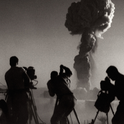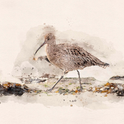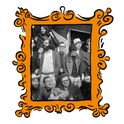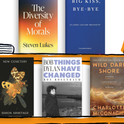© Photo by Ulf Andersen/Getty Images
Click here to download your FREE copy of our summer fiction special
Read more: Jonathan Franzen’s feuds
“So many Jonathans. A plague of literary Jonathans. If you read only the New York Times Book Review you’d think it was the most common male name in America,” bitches Charles Blenheim, an embittered novelist in Jonathan Franzen’s new novel Purity. Once a hot shot himself, “the heir of John Barth and Stanley Elkin,” Blenheim, a heavy drinker with long cornsilk hair who rides a Harley-Davidson (clearly based on the American novelist John Gardner, who died in a motorcycle accident in 1982), has outlived his early promise, and is fuming at the success of “Jonathan Savoir Faire”and his literary cohort of talented and ambitious wunderkind. He’s trying to write the “big book” that will “secure him his place in the modern American canon. Once upon a time,” he complains, “it had sufficed to write The Sound and the Fury or The Sun Also Rises. Now bigness was essential. Thickness, length.” When Blenheim’s big phallic book does come out, it is spurned by the critics.
Charles Blenheim is a minor character in Purity, and literary rivalry is not among the novel’s central concerns. Yet this playful passage can’t be dismissed as merely a parody of the literary marketplace, or a disarming piece of self-mockery. Franzen is playing for high literary stakes and in Purity (563 pages) has written a big book, too. Linked with Jonathan Safran Foer, Jonathan Lethem and his close friend the late David Foster Wallace as a contender for the Great American Novelist—and cited by bestselling women novelists of his generation (particularly Jennifer Weiner and Jodi Picoult) as a symbol of masculine critical entitlement—Franzen is no innocent bystander in the canonical debate. Unlike Weiner, Picoult and many serious contemporary novelists such as Joyce Carol Oates, who publish a book every year or so, Franzen takes his time, with lengthy gaps between novels, and a resistance to commercialism that led to his ill-advised refusal of Oprah’s book club to feature The Corrections (2001). He accepted the offer, however, for Freedom (2010).
Franzen is sometimes mocked for his writing methods, which some see as hyper-pure and pretentious—writing in a darkened room and wearing earplugs or earmuffs to shut out distracting sounds. His computer is disconnected from the internet. He even wore a blindfold when writing The Corrections. Readers of Purity may want to opt for solitude, silence and concentration as well—and earmuffs wouldn’t hurt. His new novel is an ingeniously-plotted, intricately-structured narrative that demands that attention is paid. It is not a book to be read on the beach while sipping a margarita.
Franzen doesn’t make it easy for the reader, from his unidentified and untranslated epigraph, “
Die stets das Böse will und stets das Gute schafft,” (a phrase from Goethe’s Faust: “that which always wants evil and always creates good”), to the cryptic titles of his sections: “Purity in Oakland”; “Too Much Information”; “Moonglow Dairy”; “[lelo9n8aOr]”. There’s no table of contents to give the reader an a overview, either, and there are stories nested within stories: newspaper headlines and clippings; texts and email exchanges; a large cast of characters, many with similar names (Annagret, Anabel, Aberant, Andreas): four protagonists, two male and two female, whose lives are linked in unexpected ways; and fully-realised settings from East Berlin to Santa Cruz to Bolivia. If you’re still keeping up, there’s a throwaway gem. Where a mere transition would suffice, Franzen writes (in the voice of a protagonist) a double-acrostic poem,
Muttersprache/Mother Tongue, in German and English, with the acrostic of the German side in English and the acrostic of the English side in German. Both mean “I dedicate the most glorious ejaculation to your socialism”—a sexual riposte to political commitment; a male revolutionary’s boast of his orgasmic obsession; and Franzen’s display of his verbal virtuosity. Talent to burn! Franzen is taunting us. Take that, Jonathans! Take that, Jennifer and Jodi! Take that, Pynchon, DeLillo, Joyce, and Kafka!
Yet Purity is worth the reader’s effort. It’s gripping, often funny and packed with wonderful characters, as well as a plot involving murder, revolution and conspiracy. Franzen’s large theme is the impossibility of living a life of ideological purity. He examines the conflicts between philosophic ideals and human nature, between political caution and sexual craziness, between the contemporary gathering and dumping of unmediated secret information online, and principled investigative journalism. He returns to the themes of his other novels, including the relationships between adult children and their exasperating parents, the slow agonising collapse of a bad marriage, rejection and reconciliation. He also draws on his experience studying in Germany in the 1980s, on a year-long Fulbright Fellowship, and his vast, formative reading of German literature and philosophy. Franzen has also recently edited the essays of the Austrian satirist Karl Kraus, with long footnotes that discuss his time in Germany.
Purity begins with a figure anachronistically named Purity Tyler, like a Puritan heroine, but whom is known as “Pip,” an outspoken, liberal, sexually-adventurous young woman living in a commune in Oakland, California, with no career prospects and a college debt of $130,000. Her eccentric but lovable single mother has refused to tell her her father’s name, or even to explain her own past. Pip embarks on a quest to find her father and make her fortune. When a friend recruits a sceptical Pip to the Sunlight Project in Bolivia, to work for the world-famous “leaker” Andreas Wolf, she takes the chance.
Andreas Wolf is an online outlaw in the league of Julian Assange, a charismatic, seductive figure, handsome and brilliant, with “a glow of charged fame particles, or a self-confidence so calm and mighty,” who draws everyone to him with his aura of ideological purity and commitment to truth. Unlike Assange, he is not a megalomaniac narcissist: he “disdained the rhetoric of revolution, and he inwardly winced when his workers spoke of making the world a better place. From the example of Assange, he learned the folly of making messianic claims about his mission, and although he took ironic satisfaction in being famed for his purity, he was under no illusions about his actual capacity for it.” Born in East Berlin, the son of a highly-placed figure on the Central Committee of the German Democratic Republic, and a beautiful promiscuous mother who teaches English in the university, he is protected by his family from the consequences of his rebellions against the regime. When the Berlin Wall comes down, Wolf achieves fame by making public online the Stasi archives, and then in 2000 founds the Sunlight Project, which aims to expose “toxic secrets worldwide,” especially social injustice and the abuse of women. A “militant feminist,” Wolf also has Hamlet-like rage towards his mother. Moreover, he has his own toxic secret, a crime committed for the sake of an abused East German woman he loves. Tormented by guilt, he tells his secret to Tom Aberant, an American journalist he meets in a Berlin café after the war.
Tom also has a thrilling back story that he relates in the first person; and a maddening East German mother who escaped to America. He is a writer recovering from a horrendous 12-year marriage to Anabel Laird, a meat-packing industry heiress he met in college in Philadelphia in the 1980s. An obsessive compulsive, highly competitive, neurotically sensitive would-be artist, Anabel is a monster of purity. She has a supernaturally acute sense of smell, accompanied by disgust and a frenzied cleanliness; an elaborate set of sexual rituals and conditions for perfect mutuality; a hysterical hatred of meat; a maniacal, rigid kind of feminism to which Tom consents; a rabid rejection of any taint of hedonism in life and commercial success in art. She refuses to take any of her father’s money. Her experimental film, A River of Meat is so repellant and self-righteously pure that it convinces Tom’s mother to oppose their marriage. While her plan is for the couple to be “poor and obscure and pure and take the world by surprise at a later date,” Tom discovers that his “greatest capacity was for earning money.” Their marriage is a nightmare. When Tom meets Andreas, they bond over their mutual need to erase the past. Tom helps Andreas destroy the evidence of his crime. Andreas encourages Tom to end his marriage and even accept money from Anabel’s father to launch his independent journalistic career. Andreas’s crime is never discovered; Anabel disappears, vowing that she will never be found.
Franzen has admirable ideals as a novelist. In a Paris Review interview from 2010, he describes his evolving realisation that the “hot material” he needs to explore in his fiction is not global disaster or American political duplicity, but his personal history: “My midwestern childhood, my parents, their marriage, my own marriage.” These are subjects which he believes can lead to universal meanings, “investigating the shame and fear; the shame of self-exposure, the fear of ridicule or condemnation, the fear of causing pain or harm.” The “long-term ambition for all my work,” he concludes “has been… to find the means to make visible and feelable the unsayable things inside me.” The unsayable things behind the masks of civility are “raw and frightening and bottomless,” but shame rather than civility or ideological purity is the source of serious literature.
To his credit, he fully includes women in his ideal of great fiction. Asked about Weiner and Picoult and their criticism in 2010, he agreed that “the categories by which we value fiction are skewed male and this creates a very destructive disconnect between the critical establishment and the predominantly female readership of novels.” But here there’s still a huge imbalance in his writing between male and female stories. Andreas Wolf and Tom Aberant are such colossal, self-lacerating, self-aware figures that the female characters, even the witch-like Anabel, can’t match them for interest. The most shameful, secret things for men, phallic and violent, are not the same for women. Franzen is most convincing writing about women as mothers from the perspective of a son, but he has little understanding of the urgent drives and raw secrets of motherhood, or indeed fatherhood. His female characters don’t have the narrative drive of his heroes and so far his aims for universality fall short.
Yet Franzen succeeds thoroughly with another aim he states in the Paris Review: “to bring pleasure with everything I write. Intellectual pleasure, emotional pleasure, linguistic pleasure, aesthetic pleasure.” And unexpectedly,
Purity seems closer in its effect to another of his literary contemporaries, Donna Tartt in 2013’s
The Goldfinch, than to any of the Jonathans, with its classic themes of crime, atonement, reconciliation and hope. Who would ask for anything more?












